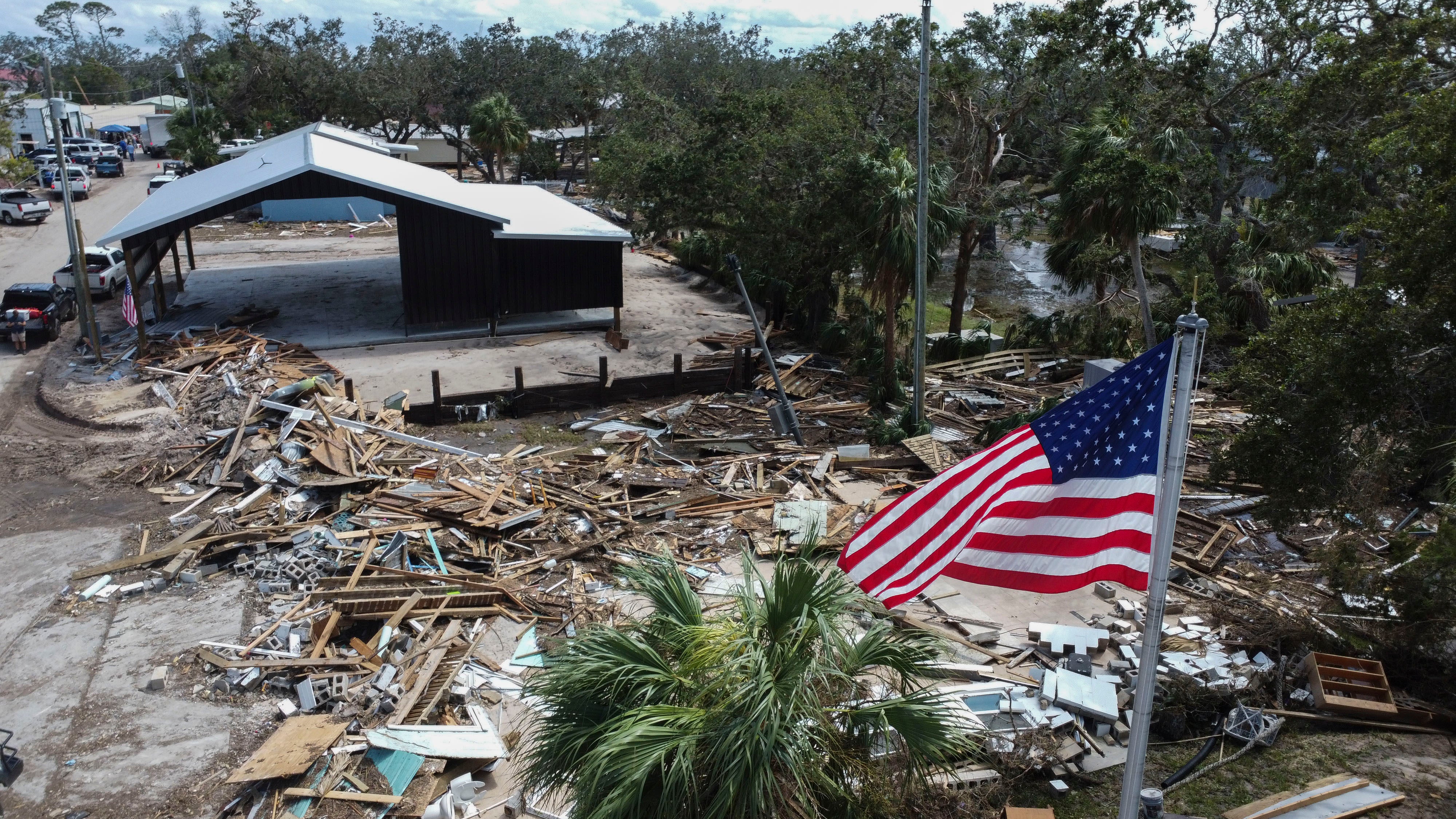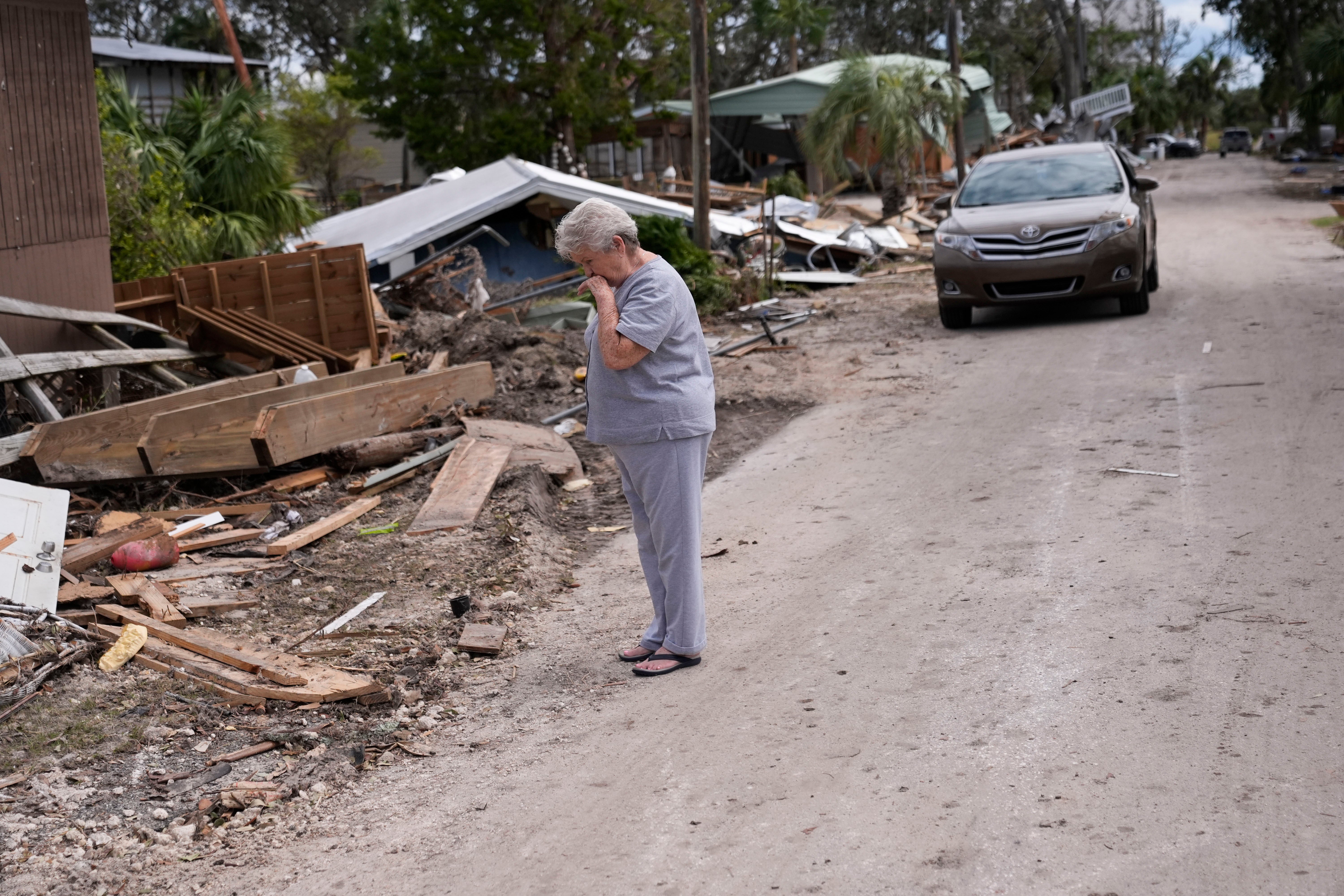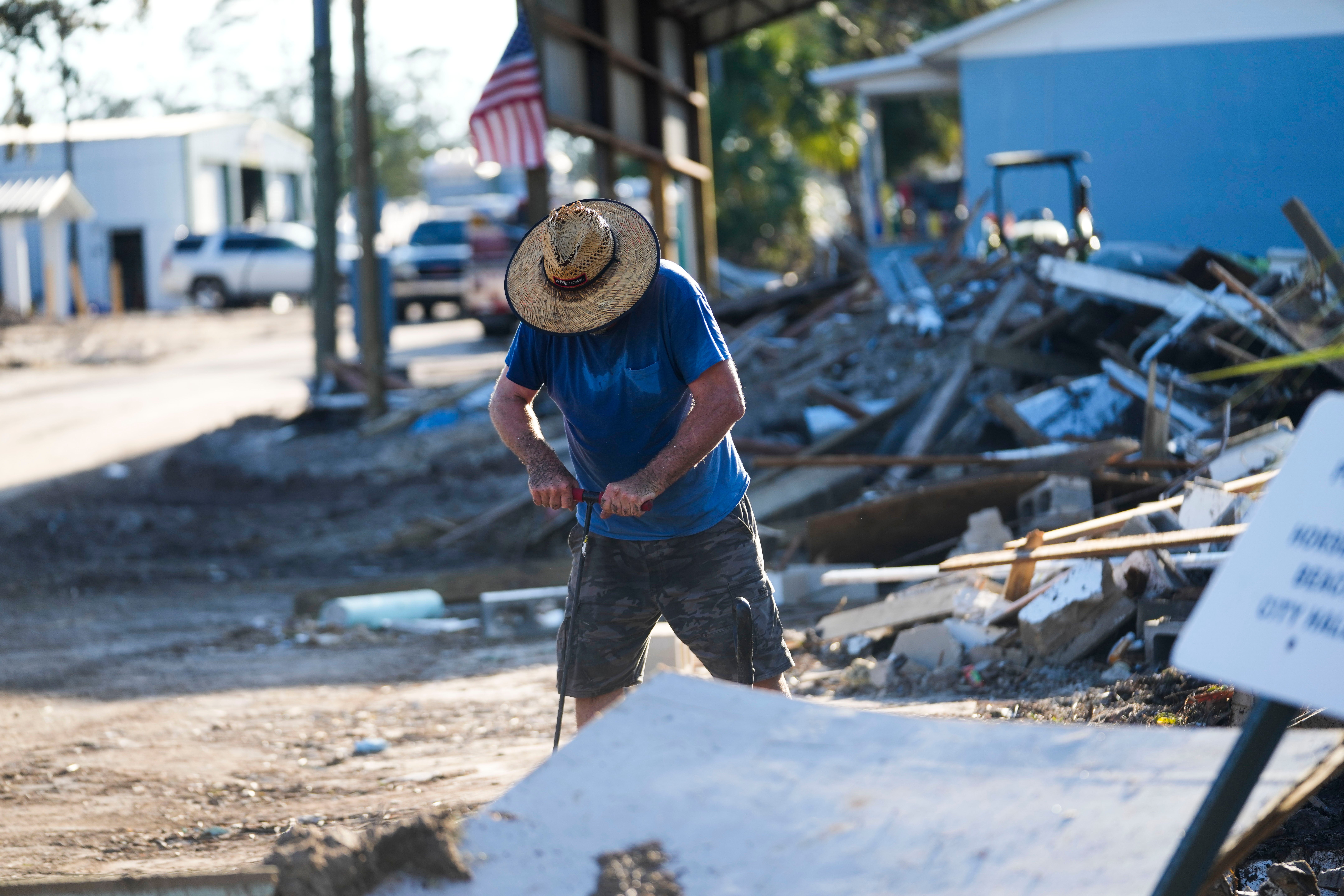At least 64 people have died as a result of Hurricane Helene, which has caused billions of dollars worth of damage as it rips across a wide swath of the southeastern US.
In a Saturday update on Helene, the National Hurricane Center said that “catastrophic and historic flooding” would continue over portions of the Southern Appalachians, though the risk for additional heavy rainfall was continuing to decrease.
The storm, now classified a post-tropical cyclone, is expected to hover over the Tennessee Valley on Saturday and into Sunday, the NHC added. Millions have been left without power after power lines and cell towers were damaged.
Among the people killed in the storm were three firefighters, a woman and her 1-month-old twins, and an 89-year-old woman whose house was struck by a falling tree, according to an Associated Press tally.
Helene blew ashore in Florida’s Big Bend region as a Category 4 hurricane late Thursday packing winds of 140mph and then quickly moved through Georgia, the Carolinas and Tennessee, uprooting trees, splintering homes and sending creeks and rivers over their banks and straining dams.
On Sunday the NHC also warned that a disturbance off the coast of Cabo Verde could form into a tropical depression in the next 48 hours, and has a 60 percent change of forming into a tropical cyclone in the next two days.
Hurricane Helene flooding made worse by global heating – FEMA
Deanne Criswell, head of the Federal Emergency Management Agency said the severe flooding caused by Helene was linked to the climate emergency.
“This storm took a while to develop, but once it did it intensified very rapidly – and that’s because of the warm waters in the Gulf that’s creating more storms that are reaching this major category level,” she said.
The conditions, Criswell said, were creating greater amounts of storm surge in the coastal areas and increased rainfall as the storms moved north.
“In the past, damage from hurricanes was primarily wind damage, but now we’re seeing so much more water damage and that is a result of the warm waters which is a result of climate change,” she told CBS’s Face The Nation.
FEMA administrator: Flooding in North Carolina beyond anything that could have been prepared for
FEMA Administrator Deanne Criswell said that the “historic flooding” in North Carolina from the remnants of Hurricane Helene has gone beyond what anyone could have planned for in the area.
“I don’t know that anybody could be fully prepared for the amount of flooding and landslides that they are experiencing right now,” Criswell said on Sunday, during an interview with CBS’s Face the Nation.
In pictures: Destruction in Florida in the wake of Helene



Tampa Bay sports teams donate to local Florida relief funds
The Tampa Bay Buccaneers have led calls for donations to relief funds in Florida communities hit hard by Helene.
A statement shared on social media by club chairman and owner Darcie Glazer Kassewitz, read: “The flooding caused by Hurricane Helene’s storm surge has been devastating to many throughout the state and specifically in our Tampa Bay community.
“There are many areas throughout our community that will require time and additional resources in order to begin the recovery. We offer our full support to those who have been impacted and are extremely thankful for the heroic and brave efforts of the many first responders and utility workers who have been working tirelessly to ensure the safety and wellbeing of our community during this difficult time.”
NHL team Tampa Bay Lightning also made donations of around $2 million, according to reports.
Where are the other storms?
Two other weather systems are being monitored by the National Hurricane Center, as the devastation from Helene continues to be assessed.
Hurricane Isaac is several hundred miles west-northwest of the Azores and and Tropical Storm Joyce is located over the central tropical Atlantic. Neither is expected to affect land.
Also in the Atlantic is a tropical wave with a medium chance to develop in the next week.
North Carolina authorities working hard to get back to ‘normalcy’
North Carolina governor Roy Cooper said state authorities are working “as quickly as possible to return things to normalcy.”
Speaking to reporters on Sunday, he said: “We know that it’s going to be a matter of time when you have communities that are cut off.
“Everyone is working as hard as we can, first, to save lives, because there’s still water rescues happening to get supplies into people, to make sure we get communications back up, and to get power back on to people, and to repair roads so that we can get from one place to the next. All of those things are important.
Cooper continued: “As soon as we are in a position that process of assessing damages will occur. We’re also going to be getting help to individual families through the individual assistance approved by this disaster declaration that we just got, but we don’t know that yet.
“That’ll be something that we’ll continue to assess, and we will work to get things to get things improved as quickly as possible.”
He added that authorities would continue to work “around the clock” on relief efforts.
Helene was an ‘unprecedented tragedy’ says NC governor
“This is an unprecedented tragedy that requires an unprecedented response,” North Carolina governor Cooper said at a press conference Sunday.
He asked residents to avoid traveling on roadways in western North Carolina not only to avoid dangers but to keep roads clear for emergency vehicles. More than 50 search teams have fanned out across the region in search of stranded people.
“Many people are cut off because the roads are impassable,” Cooper said. Supplies were being airlifted to the region around Asheville, a city tucked in the western North Carolina mountains known for its arts, culture and natural beauty.
The rescue efforts included saving 41 people in one mission north of Asheville and an infant. The teams were finding people through both 911 calls and messages on social media, North Carolina Adjutant General Todd Hunt said.
Death toll in North Carolina expected to rise says governor
At a media update briefing on Sunday, North Carolina Governor Roy Cooper said the death toll of 11 in North Carolina is expected to rise from Hurricane Helene.
Areas including Asheville are among the worst affected, and the overall death toll is now believed to be over 60.
North Carolina governor gives update on relief efforts
Watch as North Carolina governor Roy Cooper provides an update in state relief efforts.
Helene sets records in Florida
Helene made landfall in Florida’s Big Bend region as a Category 4 hurricane on Thursday, with winds up to 140-mile-per-hour. Fueled by very warm ocean temperatures, the storm was the strongest ever to strike the area.
The hurricane broke storm surge records across the Gulf Coast, many of which were last set just over a year ago, when Hurricane Idalia drenched the same area.
A record-high storm surge also inundated the Tampa Bay region, including in areas that had rarely, or never, seen flooding.
Source: independent.co.uk



